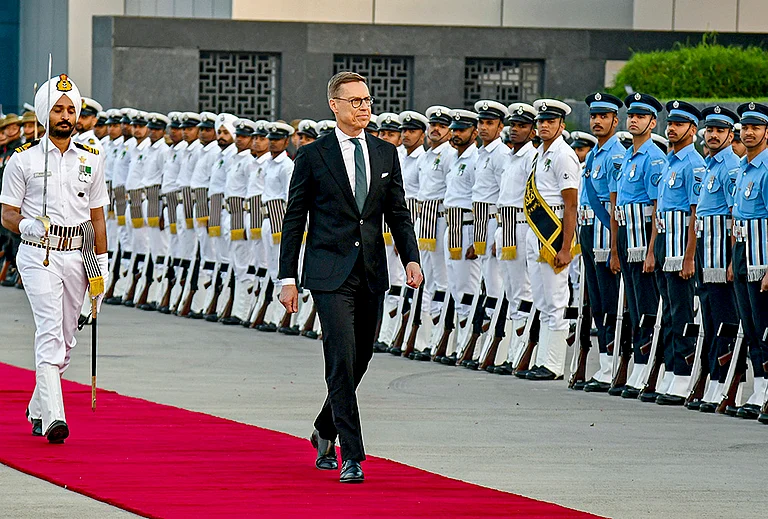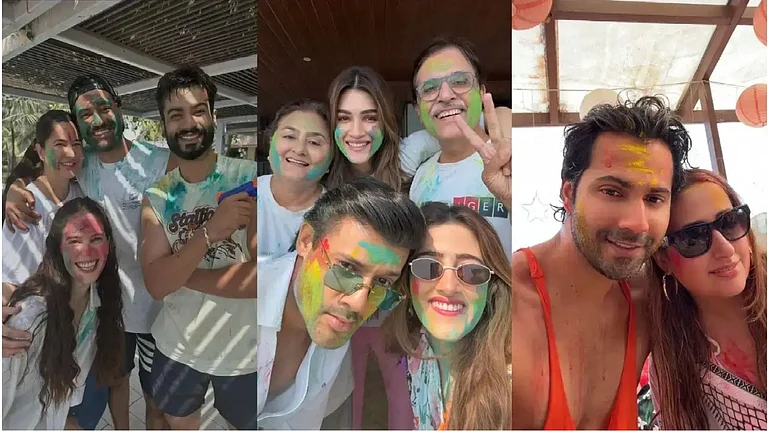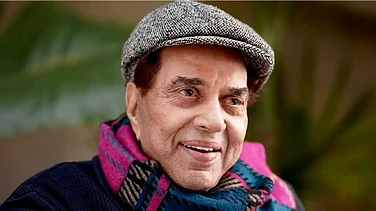At the closing ceremony of the 53rd International Film Festival Of India (IFFI), jury head, Nadav Lapid expressed his displeasure with the film ‘The Kashmir Files’ and called it a vulgar and propaganda film. That statement has caused a huge controversy among people from all sections of society on whether or not the film was a propaganda film.
In light of the same, a question arose about whether films or shows have the capacity in today’s time to actually influence people’s opinions. Or is the audience knowledgeable enough in today’s time to differentiate between what’s an art and what’s simply propaganda? Well, let’s talk to some of your favourite celebs from B-Town and find out what they think about this.
Sudhanshu Pandey
Films and shows have the ability to influence people's minds which is why the makers have to be responsible for what they are going to show as it will have an impact on the viewers' minds. I also believe that it is very important for the films like ‘The Kashmir Files’ to come about because there are certain stories that are untold, and it is important for people to know what the truth has been and what people have gone through. I feel that the Kashmiri Pandits were really feeling vindicated. They wanted their stories to be told for many years and finally, it was told. I think it’s a good story that has been told.
Nishant Malkhani
Mr Nadav Lapid, who was the head of the jury at the International Film Festival of India, called ‘The Kashmir Files’ a propaganda film full of vulgarity. I did read the whole point of view of what the jury said but I also read about what Mr Vivek Agnihotri said. Vivek made a very big claim and said that if anyone can find even a single frame in 'The Kashmir Files' which is not true he would quit films and that is a very big statement to make. I think it is not really supposed to be called a propaganda film if it is showing the truth and reality. The jury should consider and weigh their words before speaking them out like this. Maybe they are not aware of the realities of Kashmir and what happened which has been shown in 'The Kashmir Files'. They need a lesson on Indian history first and then their opinions can be counted.
Charrul Malik
This latest controversy has brought this film again in limelight. This time on an international platform again, a lot of questions were raised and many reactions have come including Bollywood. I think films and shows do influence society as a whole because the people who haven’t seen the massacre that happened in Kashmir, will believe in what is shown today. It is a very big responsibility of the directors and producers when it is said that the film is based on true events. We don’t have many films on such hard topics because we have more fiction stories. Yes, some things that were shown in the film were overhyped but yes the truth was shown too. As a viewer, there will be an impression that I will carry because I have not seen the situation that was in Kashmir. People's perception change related to hardcore subjects. I don’t know if the film has done propaganda or not but yes propaganda has happened after that. The subject that stays in controversy, the more footage it gets. 'The Kashmir Files' has broken records and with the latest controversy, it will be record-breaking again. People's thoughts and ideas are created by seeing such movies because they haven’t seen the real situation. You can’t see such movies from an entertainment point of view and of course, you get connected to them. It was instrumental in bringing out a story that deserved to be told, striking a special and lasting connection with the viewers.
Mitaali Nag
In a way films or shows do reflect our society and they can affect society or people in a positive as well as negative way because audio-visual is a very powerful tool to pass a certain message across. As far as 'The Kashmir Files' is concerned, to some people, it has come across as propaganda, to some it has not. I have friends who are Kashmiri Pandits. I have not come across a single Kashmiri Pandit family I know calling the film propaganda because they know what they have been through.
Hiten Paintal
I read about the incident. I am sure that if a film like 'The Kashmir Files' is made then they must have put in a lot of research. They have shown the reality of what actually happened. There are certain elements or certain people around who don’t want to believe it or want to call it propaganda or want to make their own narrative, but the reality is reality. Today if someone makes a film about the partition of India or the freedom struggle, those are all based on facts. Films should influence society in a good way and I am sure it does but people don’t look at the positive side and they always pick out the negative. Our films do have the power to alter people’s perceptions. Half knowledge is very dangerous so when people see certain things they will believe that it has happened and if someone makes a film on such a strong subject, they must have done a lot of research.
Ankur Nayyar
When Jews talk about the holocaust we don’t call it propaganda. We empathise with them. They won't let us forget what happened to them and what Hitler has done. There isn’t a single person who would not know about what Hitler did with the Jews. We don’t call it propaganda when they make a film on 'Shawshank Redemption' and we appreciate it as good cinema. Tomorrow if they make a film on Punjab terrorism, who gives a person the audacity outside this country to call it propaganda? The person who is going through it would know better. It’s up to you to watch the film or not watch the film but calling it propaganda is like inciting the public of that country. Similarly, with 'The Kashmir Files', it is the first time we have seen something about what happened with the people of Kashmir that has affected us and it’s because we empathise with them. Calling it propaganda is not right. You have been given so much respect and you, coming from any part of the world, how would you know what actually happened with them? If Indian cinema is trying to give an insight and you don’t agree with it then don’t watch it. You can call it a bad film but you can’t call it propaganda. Such remarks are sad to make headlines. Films do have the power to influence people but for how long you can influence them because people move on in their lives and get busy with their work. Unless and until the person is free or is paid by the authorities to create a ruckus or to create an imbalance in society. Only then the person or those groups of people will not let you forget what had happened or what the film had shown. The effect on society is there but for a very short span of time. It’s really shameful for people to whom we have given so much of respect and dignity and he is coming and insulting the choice of our cinema by just calling it propaganda. We have always stood by Israel and appreciated the films that they made on the holocaust. There is not a single film where Jews have let you forget what happened. Definitely, it’s not right what happened with them but it’s also not right what happened in Kashmir too.
Nirisha Basnett
Videos in general always had a great power since their invention. Today, with technology being so advanced and with everyone carrying a cell phone and glued to it all the time, there is just no escape. One definitely has to filter what content to watch, how much time to devote watching and most importantly, what lesson to take from there. When it comes to cinema/shows, obviously it does have a greater impact on society. No doubt that it’s a great escape from real life. It connects to people of other cultures, takes you to places one hasn’t travelled and shows you the things that one has no idea about. There is so much to witness and learn and it makes one more aware and also helps to improvise in emergency situations. But then, just like any other thing, it too comes with its negative side. Often cinema stereotypes various things and creates false notions of people and communities. It is also considered to be a waste of time and money as some contents are pure trash and don’t teach something valuable. Not to mention, the demonstration of violent/sexual content. But at the end of the day, it’s one's own awareness and maturity on what exactly to watch and what things to take from it as a lesson. Eventually, it depends on the person regarding how much one is allowed to get impacted/influenced by those contents. One shouldn’t set unrealistic and unreal expectations from it but instead channel it all to learning and getting new insights into life.
Nikhil Nanda
Films are the strongest power that has been utilized in the last 40 years to propagate myths and fallacies about a particular community and always depict that terrorists or terrorism have no religion. The world is seeing different things and I think 'The Kashmir Files' brings it very well. We need to learn to call a spade a spade until and unless we do that, there is going to be no change in society. If a particular religion is propagating terrorism we got to call it out. If the film industry is dominated by a particular religion which is feeding fallacies and false information through soft movies, we need to call it out. I think 'The Kashmir Files' is a beautifully made movie and it deserves all the applause. Kudos to Vivek.























